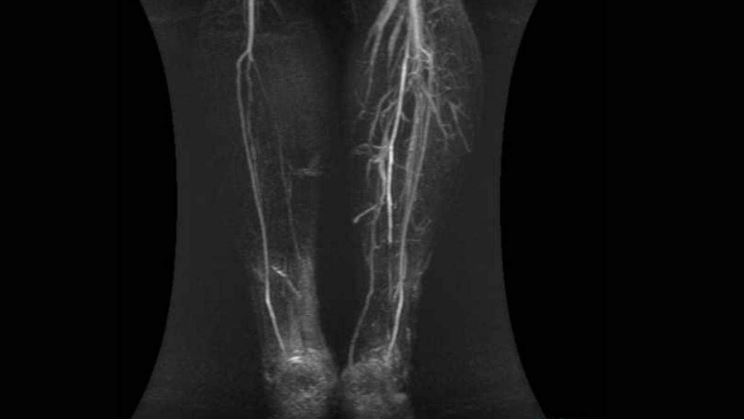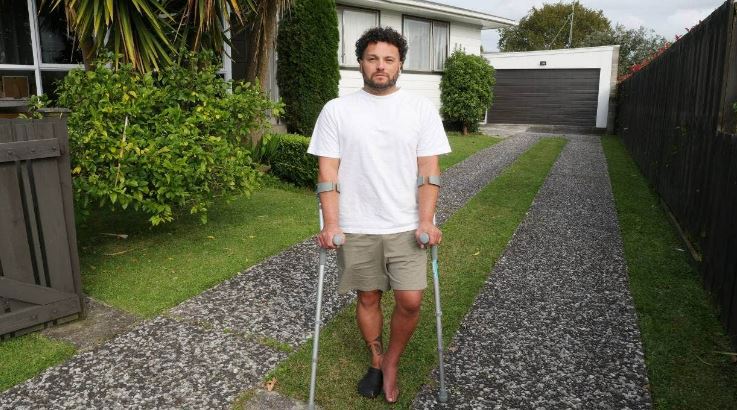New Zealand man Pita Shelford (Te Rarawa, Ngāpuhi) knew something wasn't right as soon as he woke up from surgery – from hip to toe, he had no feeling in his left leg.
Within a week it had turned dark purple, and was swollen and cold to the touch.
He'd had spinal cord surgery in January 2022 to drain a cyst from his neck to waistline; according to medical staff the operation went as intended, but he was left with debilitating side effects including reduced mobility and neurological function, and regular shaking fits.
READ MORE: 'Moving with the times': Sweeping changes made to housing grants

In private correspondence, staff from Waikato Hospital have acknowledged some gaps in his treatment, including failure to lodge an ACC treatment injury claim, and incomplete discharge documentation which delayed his rehabilitative care.
Shelford's spent more than a year trying to get answers about what went wrong and for the hospital to take ownership of those mistakes, including seven formal letters and a complaint to the Health and Disability Commission.
"There was nothing wrong with my left leg prior to surgery, and now there is everything wrong with it," he said.
The father, PhD candidate and husband previously enjoyed exercise and travel, but is now unable to walk without aid, and he's had to come to terms with paralysis and loss of sensation in his leg.
Shelford said his interactions with the health system had been "appalling", and left him "managing life, not living life".
READ MORE: Five people shot after complaining about neighbour's gunfire

A 'successful' surgery
Initially, Shelford was told the surgery to insert a draining shunt "was a success".
When he raised concerns about limited circulation, with blood flow reduced to about a third of what it would usually be, he was told to just do his weekly physio.
Shelford eventually sought a second opinion from private neurosurgeon Dr Peter Heppner, who was surprised that no imaging had been done for two months following the surgery "given Pita woke with a profound neurological deficit".
"Unfortunately given the time that has lapsed since surgery with such a profound neurological deficit, I do not see any likelihood that there is going to be significant functional improvement for Pita over time," Heppner wrote in an assessment for Shelford's GP.
"I think he would therefore be classed as being permanently disabled."
Five months later, Shelford was still missing feeling in his leg and sought a third opinion from another private neurosurgeon, Dr Peter Gan.
He was told that his shunt wasn't in the right position and was pushing into the fibres of his spinal cord, leading to nerve damage. Waikato Hospital eventually issued him with a wheelchair.
Gan said an ACC Treatment Injury Claim should have been submitted the day Shelford woke up from surgery – that didn't happen.
In response to a complaint, Waikato Hospital nurse director Kim Holt wrote in a letter that "the treatment injury was not evident at the time of discharge".
Shelford ending up filing his own claim via his GP, chasing the hospital over an eight-month period to provide his health information to ACC before the claim could be approved. During that time, he had to self-fund his rehabilitation.
READ MORE: Australians warned to get vaccinated as 'triple virus threat' looms

Fight for review
In October 2022, Shelford was told his surgery would undergo an adverse event review which would produce recommendations for the Health Quality & Safety Commission.
However, in March 2023 Shelford was told by panel chair Dr Margaret Fisher that his case did not meet the criteria for "an SAC1 or 2 serious event review", and therefore a formal report would not be produced.
Te Whatu Ora declined to comment on why Shelford's case had not been subject to an Adverse Event Review, and said all necessary information had been shared directly with the patient.
In a letter responding to Shelford's complaints about the lack of an Adverse Event Review, Waikato Hospital's interim lead of hospital and specialist services Michelle Sutherland and interim operations director Kim Holt wrote that initially, "the decision was to lodge it as a serious event in order to generate this review", but that "in hindsight this was the incorrect process to follow".
READ MORE: Snake season is coming to an end. But where do reptiles actually go?

Another letter, in place of a formal report, arrived over a year after the surgery and did not involve consultation with Shelford. There were no answers for why he had experienced such a significant loss of blood circulation since the operation.
Shelford said the letter was "disappointing, to say the least".
"This to me is a broken promise and a cop-out," he said. "We were told we'd be part of the process and that didn't happen."
Sign up here to receive our daily newsletters and breaking news alerts, sent straight to your inbox.
